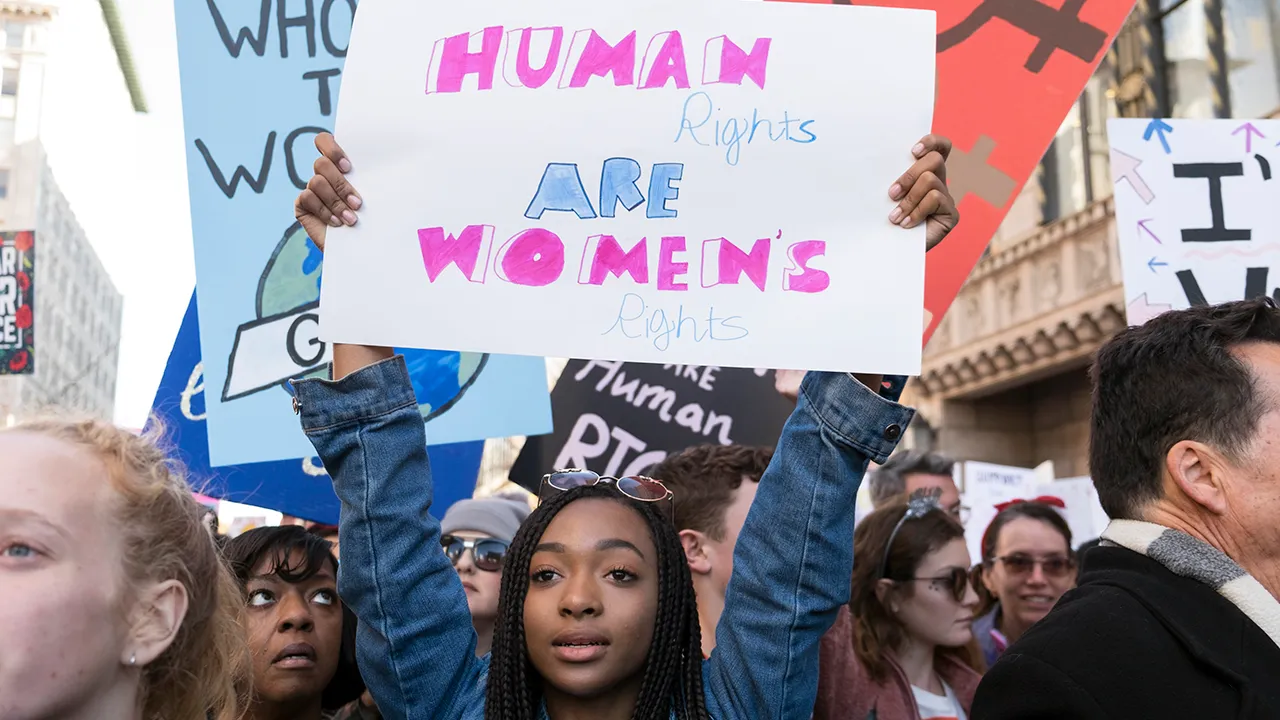By Mariam Karagianni,
Have you ever wondered when exactly feminism turned from a radical and revolutionary movement to a quirky buzzword printed on pretty tank tops? To me, it seems as if it has lost its teeth upon entering its 4th wave (from the 21st century onward) and has crystallized into this comfortable cause that thrives off hashtags and the idea that it’s a niche lifestyle, depicted in 15-second TikToks and BuzzFeed articles, rather than a universal fight for justice. If you may, let this be a critique of what we call liberal feminism.
In retrospect, when asked about the divisions of modern feminism, there are two overlapping answers as depicted in “Feminism for the 99%: A Manifesto.” The authors present Sheryl Sandberg, who worked as COO at Meta and is the founder of the non-profit LeanIn.org. With her impressive education at Harvard and a striking net worth of 2.3 billion USD, it’s easy for her to encourage women that they could solve a lot of their problems by leaning in and breaking glass ceilings (which means that they should go after leadership roles that are predominantly male). She and similar personas see feminism as a handmaiden of capitalism and believe that feminism operates in the social whole by dividing the task of tethering to systems of exploitation and oppression to both sexes. Sounds empowering, doesn’t it? By appointing a few female CEOs or high-profile executives, the women at the base that uphold this hierarchy remain overworked and underpaid, child labor is perpetuated indefinitely, and there are still men working in hazardous conditions, risking their lives and long-term health. But hey, we should be grateful it’s a woman committing these crimes and not a man because, you know… girl power!
For the other side of feminism, the manifesto brings up the 2018 militant strike of five million women in numerous parts of Spain. Their goal was to denounce sexual discrimination, domestic violence, and fight against the wage gap. In 2016, against the Polish parliament’s bill to ban abortions, 100,000 protesters marched the streets and, by 2020, in addition to the ban, they fought for attaining full women’s rights and their bodily autonomy, and the return of an independent and neutral Supreme Court of Poland. In 2016, also, Argentina was shocked by the rape and brutal murder of Lucía Pérez, an event that caused widespread anger within the country. The girl became the face of a movement called “Ni Una Menos” (Not One Less), causing riots against femicide, a problem very much prominent in Latin American countries. Soon after that, strikes and marches began in various parts of the world—in Europe, America, and Asia—with the goal of putting an end to the misery of women and capitalism, the system that is at fault for all malfunctions in our society. Thus, the question arises: should we, as women, go after “equal opportunity domination,” all while the majority of the planet’s population is suffering under those neoliberal structures, or should gender justice be reimagined in an anti-capitalist form that will gradually lead us into a new society?

The mainstream media does very little to aid the hemorrhaging credibility the movement has among people nowadays. Questions like “Why do we need feminism anymore?” and “But both sexes are legally equal, aren’t they?” pop up all the time. This is due to equating traditional feminism, a transformative political force, with its liberal counterpart, which withholds itself as a checklist of achievements (female CEOs? Check. Marketable, catchy phrases? Check. Discussions about bodily hair instead of literally anything else of value? Check.) that, at the end of the day, are part of the general problem.
Keeping in mind that the beneficiaries are mostly well-off white women that possess adequate education and socioeconomic advantages, who can afford to limit their concerns to these surface-level topics, the movement automatically comes off as elitist and with strong individualistic values that juxtapose its unifying nature. A good example of this is the so-called “choice feminism.” It states that no matter what a woman consciously does, it’s inherently a feminist choice just from the fact that she’s a female doing something. The idea stems from the notion that in the past, under a more rigid patriarchal rule, women’s choices were made for them. Therefore, now, they’re breaking their chains. And as a result, here come the oversaturated hashtags of #girlboss and #girlpower, and your favorite (white) female celebrity reassuring you that she’s a feminist, so you should be too. Because, you know. You’re a woman after all, and it’s the fashionable thing to do. Duh!
According to Jessa Crispin in “Why I Am Not a Feminist,” the actual feminist work of creating a more equal society, though, is as unfashionable as it has ever been. To her, it’s because “In order to make feminism palatable to everyone, they have to make sure no one is made uncomfortable by feminism’s goals; so the women who advocated for radical societal changes are out.” This makes its entire point… pointless. Please do not (with huge emphasis on not) mistake radicalism as the act of throwing out your bras, growing your bodily hair to Rapunzel’s length, and outing all men from society. Our real-world issues do not lie either in one’s undergarments or in dismissing the other half of the population as dimwits and useless (ahem, though this had been their attitude towards women for a couple of millennia or so).

All this energy put into these BuzzFeed-inspired protests (whether physical or online) must be redirected into creating newer and empathetic social structures that do not exclude poor and middle-class women, regardless of their race, ethnicity, and place in the world. It should be put into creating organizations that will actually tend to the failures of empathy in this world, such as the genital mutilations of young girls in African countries, the problem of wedding kids to people 4-5 times their age, forced prostitution, and many more, whose root is patriarchy, poverty, and lack of education. And for God’s sake, stop saying that sex work (whether that’s prostitution, stripping, pornography, or OnlyFans) is “empowering.” If that were the case, women would not be trafficked into that position, would they? Because, personally, I have never heard of anyone being trafficked into selling me shoes at the department store, for example.
Conclusively, our job as feminists should not be forced recruitment into this cause just because it’s the right thing to do (according to the newest GQ article). Instead, we must listen to the struggles of women that might be very much different from us, that may be less privileged than us, to their wants and needs, discarding whatever condescending attitude or prejudice that we might have subconsciously. We do not ask women of other religions, for example, to devalue what they hold to be most valuable about their life (like their faith); instead, together, we fight actual fights toward a more just future.
References
- Cinzia Arruzza, Tithi Bhattacharya, Nancy Fraser. “Feminism for the 99 percent. A manifesto”. Verso, 2019
- Jessa Crispin. “Why I am not a feminist (a feminist manifesto)”. First Melville House Printing, 2017




